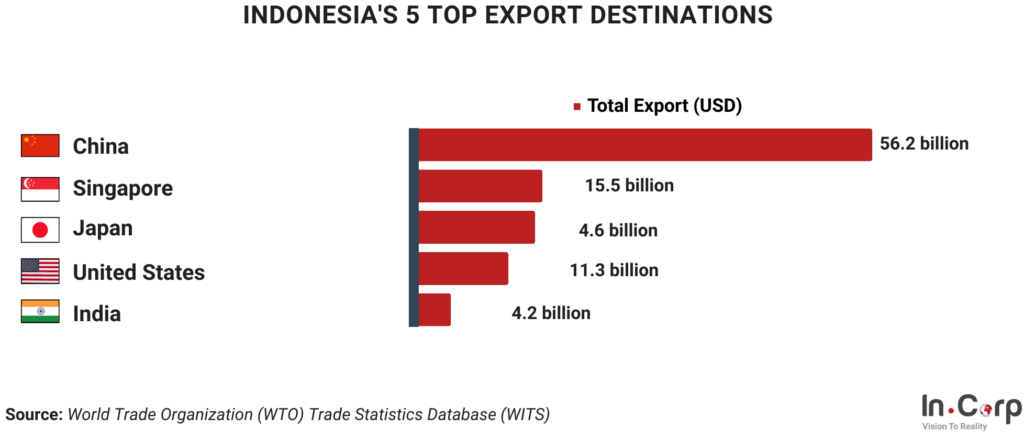Indonesia’s Trade Relations with China: What Exporters Need to Know
China remains one of Indonesia’s most significant trading partners—both in terms of imports and exports. For Indonesian exporters, particularly those dealing in agriculture, coconut derivatives, spices, and raw commodities, understanding the dynamics of trade with China is essential to entering and thriving in one of the world’s largest markets. In this article, we’ll explore the current state of Indonesia-China trade relations, key opportunities, regulatory updates, and practical insights for exporters.
Admin
6/6/20252 min read


1. The Strength of the Bilateral Trade Relationship
According to Indonesia’s Ministry of Trade, China has consistently been Indonesia’s number one export destination, with bilateral trade volume surpassing USD 127 billion in 2024. Key Indonesian exports to China include:
Coal and palm oil
Coconut and coconut-based products
Spices and herbs (ginger, cinnamon, cloves, pepper)
Seafood and aquaculture
Rubber and textiles
The Regional Comprehensive Economic Partnership (RCEP), which includes both Indonesia and China, has further lowered tariff barriers and simplified customs procedures.
2. Top Opportunities for Indonesian Exporters
There is growing demand in China for:
Organic food products: Organic virgin coconut oil, desiccated coconut, and coconut sugar
Functional ingredients: Spices such as turmeric, ginger, cinnamon, and cloves for traditional Chinese medicine and food sectors
Coconut charcoal briquettes: As clean fuel for cooking and heating
Processed foods with Halal certification
China’s middle-class population is increasingly turning to natural, clean-label products, and this trend creates room for niche, high-value goods from Indonesia.
3. Regulatory Compliance: What You Need to Prepare
To export to China, you must comply with strict regulatory frameworks. These include:
GACC Registration: All foreign food manufacturers must be registered with China’s General Administration of Customs (GACC).
CIQ Inspections: Products undergo quality inspection by Chinese customs. Ensure your documentation, labeling, and packaging are accurate.
Language Requirements: Labels must be in Mandarin and include nutritional facts, origin, and expiration date.
Halal Certification (optional but recommended): Many Chinese importers prefer Halal-certified goods for broader consumer appeal.
4. Logistics and Port Access
Major ports used for Indonesian exports to China include:
Port of Belawan, Panjang, Palembang, Jambi (Sumatra) for coconut and palm-based products
Tanjung Priuk (Jakarta), Tanjung Perak (Surabaya) for spices and agro products
Direct shipping lines to Chinese ports such as Shanghai, Guangzhou, and Shenzhen
It’s crucial to work with logistics partners who understand custom clearance procedures and temperature/humidity control for sensitive goods.
5. Building Strategic Partnerships
To succeed in the Chinese market, you need more than a good product—you need local representation or partnerships. Consider:
Appointing local importers or distributors
Attending trade expos in China (e.g., China-ASEAN Expo, FHC Shanghai)
Offering private labeling and OEM services to Chinese brands
Ensuring competitive lead times and clear communication in Mandarin (or through local agents)
6. Risks and Risk Management
Some challenges you may encounter include:
Trade policy fluctuations and import restrictions
Changing food safety standards
Payment security—opt for Letter of Credit (LC) or trusted escrow arrangements
Intellectual property protection for your brand
By working with experienced legal and export professionals, many of these risks can be mitigated effectively.
Conclusion: China Remains a Key Market for Indonesian Exporters
With its massive consumer base, rapid urbanization, and growing appetite for natural and premium-quality products, China represents a golden opportunity for Indonesian exporters—especially those offering sustainable and certified agricultural goods.
At PT Linggau Jaya Eksportir, we have the experience, certifications, and supply chain efficiency to serve the Chinese market confidently and professionally.
📨 Looking to Export to China?
We offer full export support, including documentation, GACC registration assistance, and Mandarin labeling.
📧 Contact us at contact@llgexport.com
🌐 Visit: www.llgexport.com
PT Linggau Jaya Eksportir – Your Trusted Export Partner to China and Beyond



